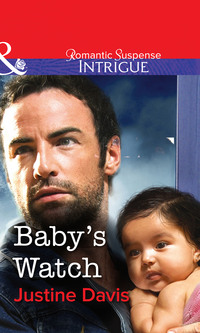Książki nie można pobrać jako pliku, ale można ją czytać w naszej aplikacji lub online na stronie.
Czytaj książkę: «Baby's Watch»
Baby’s Watch
Justine Davis

MILLS & BOON
Before you start reading, why not sign up?
Thank you for downloading this Mills & Boon book. If you want to hear about exclusive discounts, special offers and competitions, sign up to our email newsletter today!
Or simply visit
Mills & Boon emails are completely free to receive and you can unsubscribe at any time via the link in any email we send you.
Table of Contents
Cover Page
Title Page
About The Author
Chapter 1
Chapter 2
Chapter 3
Chapter 4
Chapter 5
Chapter 6
Chapter 7
Chapter 8
Chapter 9
Chapter 10
Chapter 11
Chapter 12
Chapter 13
Chapter 14
Chapter 15
Chapter 16
Chapter 17
Chapter 18
Chapter 19
Chapter 20
Chapter 21
Chapter 22
Copyright
Justine Davis lives on Puget Sound in Washington. Her interests outside of writing are sailing, doing needlework, horseback riding and driving her restored 1967 Corvette roadster—top down, of course.
Justine says that years ago, during her career in law enforcement, a young man she worked with encouraged her to try for a promotion to a position that was at the time occupied only by men. “I succeeded, became wrapped up in my new job, and that man moved away—never, I thought, to be heard from again. Ten years later he appeared out of the woods of Washington state, saying he’d never forgotten me and would I please marry him. With that history, how could I write anything but romance?”
Chapter 1
Cops, federal agents and the people who wrote glamorous stories about them, were all crazy. There was freaking nothing glamorous about undercover work, Ryder Colton mused as he stubbed out his last cigar.
In fact, he thought wryly, the only difference between his life right now and his life seven months ago was that now he was sitting in the dark in a stand of scrub brush, unable to leave, instead of in a cell at the Lone Star Correctional Facility, unable to leave.
Well, that and the cigar, he amended silently. He’d missed the taste of the Texas-born Little Travis cigars he’d gotten attached to when he’d started running with the older and greatly admired Bart Claymore at fifteen, and bummed them from him.
Bart was one of the men who’d left him holding the bag the night that had started him on the road to prison—an irony that wasn’t lost on him. Then there was the irony of his entire situation: that he, the bad boy of the Texas Coltons, was here pretending to be one of the good guys. Near the end—or so he hoped—of his search. A search that had brought him back to, of all places, the Bar None ranch. Now that was irony.
And irony was a word he’d never used in his life before now. He only vaguely remembered a discussion of it in some class in school, before he’d landed himself in juvie detention the first time. He must have paid more attention than he’d thought, because now, all of a sudden, it made perfect sense.
You’re smarter than you want to believe.
Boots’s words echoed in Ryder’s head. The first time he’d said them, Ryder had laughed in his face; he never would have pegged the leathery, prison-toughened convict as a do-gooder. But Boots Johnson hadn’t been the first one to tell Ryder he was smarter than he was acting. He’d heard the litany countless times before, from teachers, counselors, and family—especially Clay.
Ryder winced inwardly at the memory of his straight-arrow, stiff-spined brother. Clay had done his best when their mother had died, leaving the eighteen-year-old with a fourteen-year-old sister and a sixteen-year-old brother he had tried to take care of. Georgie had turned out okay, her only mistake was falling for that city slicker. But that had given her little Emmie, the pride and joy of her life.
His niece.
He remembered the moment when he’d told Boots about her.
So, you’re an uncle, the old man had said.
He’d blinked, opened his mouth to say “What?” then shut it again. Emmie had been born well over a year before he’d landed here, and until that moment he’d never thought of himself as an uncle. A relative. Connected.
Not that his sister would want her now five-year-old little girl connected to him. Georgie was too determined that her little girl have a good life, and somehow he doubted that plan would include an uncle convicted of a felony who’d been in the federal pen most of her young life.
He considered lighting another cigar and decided against it; he only had a few more, and they were hard to come by. If nothing else, he’d learned in prison that his live-as-if-there-were-no-tomorrow philosophy wasn’t always the best policy. And his motto—have your fun today—had landed him in a very tight spot.
Thankfully, the sky was getting lighter now, so he had to pack it in. He was tired from lack of sleep, also from the endless hours of sitting, watching, waiting for something that didn’t happen.
And thinking. Most of all, he was tired of the thinking, the contemplating, the pondering. His brother had been the thinker of the family—not him. But sitting out here all night long, there was nothing else to do.
And he knew now why he’d always avoided it. It was much easier to just live his life, doing what seemed like a good idea at the time…
“And look where that landed you,” he told himself as he buried the stub of his last cigar and headed back to the ten-year-old, battered pickup he was driving these days. They’d offered him a standard-issue, plain-wrap sedan, which he had wryly told them would stand out in Texas ranch country like a neon sign.
“Why don’t you just paint Narc on the side and be done with it?” he’d said, earning him a frown from Furnell, his main handler.
Handler. That’s actually what they called him. That had been the sourest bite in this whole stupid meal. Ryder Colton, the man who never let anybody, man or woman, “handle” him, not even his own family, was now owned by a dark-suited, overly tense type A. At least, he was for now.
And if that wasn’t bad enough, he wasn’t even watching for drug runners or murderers, nothing dramatic or exciting like that.
No, Ryder Colton, the bad boy of the Texas Coltons, was on baby patrol. Now there was some irony.
He got into the truck and started it, the smooth purr of the motor belying the battered exterior, exactly the reason he’d wanted it. He, the guy who’d worked so hard at not doing what his father had done, leaving a string of bastards across the country, was now trying to earn his way out of prison and a felony record by helping some über-secret government agency crack, of all things, a baby-smuggling ring.
If they’d purposely searched out someone less suited, they couldn’t have found him, Ryder had thought when they’d first approached him. Not only had he never had anything to do with babies, his life experience didn’t include any knowledge whatsoever of what it would be like for a loving parent to lose a child. He’d never known anyone like that.
Well, Georgie. He had to admit that his sister obviously loved little Emmie. But he couldn’t help thinking that was because she’d had the same experience he had, and was trying to make up for it. Or maybe she loved Emmie like she loved her horses, only…more. Maybe that was what it was like.
God, he was going slowly insane. He’d laugh if he weren’t so tired. And bored.
He drove carefully—and as quickly as possible—through Esperanza, on his way back to San Antonio, where he was staying. He hadn’t wanted to take the chance that someone in Esperanza might recognize him. While he looked a little different now—his hair was shorter and he’d filled out a bit—he’d been too well known, even notorious he supposed, in this little town to skate by unrecognized. It was much safer to lose himself among the million-plus population of the second largest city in the state.
The thought of doing it for real, taking this chance and just losing himself, dumping this crazy assignment he’d taken and making a break for it, starting over somewhere else, occurred to him, and not for the first time. East, to New York and the big city? Hell, he could lose himself forever there. Or L.A., maybe, warm, and thankfully dry weather, the beaches, paradise, right? He could lose himself there, too.
You can lose yourself anywhere. It’s finding yourself that takes effort. You throw yourself away often enough, and one day you don’t get it back.
Boots hadn’t been talking about New York or L.A., but his words echoed in Ryder’s head all the same. He didn’t think he’d forgotten one single thing the older man had ever told him.
He’d thought at the time that it was just typical of his misbegotten life that he’d find the first human being who really gave a damn about him—the real him, not the impossible ideal Clay had always expected him to live up to—in a place like the Lone Star Correctional Facility. And that it would be a reformed armed robber who’d drawn the max because two people had died as a result of his crimes.
But regardless of all that, for the first time in his life, he started to see the way he was living it as a waste. He’d never worried about that before, rarely thought about it, but somehow Boots made him care. Made him want to change, to try another way.
He’d just never figured it would be such damn hard work. And he wasn’t thinking about the job he’d taken on. That was the easy part.
He shook his head wearily, and drove on into the rising sun.
Ana Morales stood on the front porch of Jewel Mayfair’s precious Hopechest Ranch house. She rubbed at her aching back with one hand as she gazed out over the ranchland bathed in the morning sun. To the east was San Antonio, she knew, although she had not ventured into that city the whole time she had been here. She could not risk it.
To the north was the vast, rolling, beautiful hill country of Texas. She would like to see it someday; she had heard so much chatter about everything from inner-tubing down the Guadalupe River to Saturday nights at the state’s oldest honky-tonk. She smiled with a linguist’s pleasure at the word; and Americans thought Spanish was odd!
Her pleasure at the word faded as she wondered if she would ever get to explore her love of languages again. Becoming a teacher had been her dream since childhood…and now here she was, nearly ready to bring a child into the world herself.
And by herself.
She turned to go back inside, back to the room Jewel had given her, no questions asked, at Ana’s request; the room that looked out onto this porch—and gave the occupant a chance to see anyone who arrived. Before being seen herself.
She had been useful here. She had found purpose, something to focus on as she waited for the precious life within her to come into the world. And she had found someone else to worry about, she admitted; Jewel had been kindness personified to her, but Ana knew Jewel was deeply troubled. Too often, when Ana got up in the nighttime hours, suffering from the inability to find a comfortable position for her expanded body, she would find Jewel already up and walking the house. Sometimes Jewel had clearly been up for a while, sometimes she had the slightly wide-eyed look that told Ana she had been jolted awake by one of her nightmares.
It was those times that Ana felt rather small; this woman, who was working so hard here to provide the hope of the ranch’s name to troubled kids, had had so much tragedy in her life. And yet she found solace in her work here—although not peace.
Or sleep.
Ana instinctively smoothed a hand protectively over the mound of her belly; she could not begin to imagine the horror of losing this child before it had a chance to live, as Jewel had lost hers. This life within her had been the impetus for everything she had done in the past seven months, since the day she had first suspected that she was pregnant.
“Getting heavy, that little one?”
Ana whirled around as quickly as she could, given her current bulk, chastising herself for getting so lost in her thoughts that she was caught off guard. That Jewel sometimes moved like a wraith around this place was no excuse in her mind.
“Sorry, I didn’t mean to startle you.”
“It is all right,” Ana assured her. “I was actually just thinking about you. Did you finally get to sleep last night?”
“Some,” Jewel said, but her weary brown eyes beneath the tousled cap of golden-brown hair told Ana that “some” had not been enough.
Doctor, heal thyself, Ana thought, although strictly speaking she knew Jewel was a psychologist, not a physician.
“Is there any more word?” Ana asked, turning to the subject that concerned her most; the very thought that a baby-smuggling ring was operating in the area terrified her. More than once she had thought she should move on, take her unborn child to a safer place, but she knew the folly of that; she had found shelter here, in a climate where most looked upon her as an enemy, just another illegal come to milk the American system. Of course, she was nothing of the kind.
She was secure here at the Hopechest Ranch, and it was simply up to her to keep her baby safe.
“Not that I’ve heard,” Jewel answered. “But Adam will probably stop by later, and then I’ll know for sure.”
Ana smiled at the woman seventeen years her senior, and painfully wiser. “He is visiting more and more, Deputy Rawlings.”
At first the sheriff’s deputy had made Ana nervous, given her shaky immigration status. But the tall, strong man with the perfectly groomed dark hair and the always razor-creased uniform seemed only to have eyes for Jewel, which suited Ana just fine. Jewel deserved some happiness and his attention provided her benefactor—and herself, she admitted—with firsthand information on the ongoing investigation.
Jewel smiled, but absently. “Yes, he is.”
“You do not like him?”
“Of course I do. He’s been very kind to me.”
“But…?”
“I’m not ready for that.”
She didn’t clarify, and Ana didn’t ask. She had her own problems and wasn’t about to counsel anyone in an area where she had made so many mistakes herself. She had trusted where she shouldn’t have, and now she was paying the price. That one of the men she had trusted had been her own father didn’t absolve her. Once she had found the evidence of his true character, it seemed the signs had been so clear she couldn’t forgive herself for having missed them.
As for Alberto…she could not forgive herself for that, either.Yes, he was smooth, convincing, but so was her father.
Her baby kicked, mightily, as if the thoughts of traitorous men were unsettling to more than just her. She smiled as she put a hand over the spot.
“Kicking?” Jewel asked.
“Yes,” Ana said, her smile widening. And then, suddenly remembering, her smile vanished. “Oh, Jewel, I am so sorry. It must be terribly hard for you to have me here, to see me, with my baby.”
Jewel waved her to silence. “It’s all right, Ana. I will never get over the loss of my baby, but I don’t expect the world to stop turning and other women lucky enough to be pregnant to hide, just to spare my feelings.”
Ana studied the benefactor who was rapidly becoming a friend. “You are very wise,” she said.
“What I am,” Jewel said frankly, “is very tired.”
“I know,” Ana said. “Is there anything I can do for you? Something else I can take over, so you can rest? Perhaps you might have better luck sleeping in the daytime?”
If Jewel was offended at the suggestion, or bothered by Ana’s knowledge of her sleepless nights, she didn’t let it show.
“I’ll let you know. Thank you.” A smile flashed across Jewel’s face. “Unless you want to go riding with the older girls over at the Bar None this afternoon. I’m sure Clay can find a nice, gentle horse for you. You haven’t left the ranch since you got here.”
Ana was sure by Jewel’s laugh that her fear must have shown in her face.
“Even if I could get this—” she gestured at her own bulk “—into a saddle, I wouldn’t. Horses and I…no.”
“You’re in Texas now, girl. Better learn to love them.”
“I do,” Ana said. “They’re beautiful creatures. But I prefer to admire them from a distance.”
“You’ll get over it,” Jewel predicted. “It’s in the water. And soon,” Jewel warned her with a smile, “I’m going to make you take a break and have some fun.”
Ana retreated to her room after that, wondering if the word fun would ever again be in her lexicon. It seemed a very, very long time since she had done anything but worry and plan and pray.
She stretched, trying to ease her aching back. If Jewel wouldn’t take her advice about a nap this afternoon, perhaps she herself would. Along about three she was usually beginning to feel the strain of the extra weight she was carrying. Her feet would swell, her back would throb, and there would be nothing more welcome than to lie down for a while.
Except then there would be no distraction, nothing to keep her from dwelling on the unpleasant facts of her situation. She was twenty-two, unmarried and not likely to marry. She was about to become a mother, with a past in shambles behind her. But she was determined to build a life for herself and her baby.
She had never felt more alone.
And then the baby moved again. Ana set her jaw and her courage.
She was not alone. She had a tiny, helpless human being depending on her. A child she already loved beyond measure. She would make sure that child had a chance.
She would do whatever she had to to make that happen.
Chapter 2
By the time he reached his small, nondescript motel room, Ryder was feeling the too-familiar sensation of physical weariness coupled with being mentally amped up. It would be another day of restless sleep. He was definitely a night owl and used to sleeping in daylight—that was, according to Clay, one of his biggest failings—but doing nothing made him crazy.
“Buenos dias, mijo.”
With his key—no modern card key for this old place—still in the door to his room, he looked over his shoulder to see the source of the “Good morning.” It was Elena Sanchez, the tiny, round woman who ran this place with her husband, Julio. They’d been married, she had told Ryder at one point, nearly fifty years. The concept of being with one person that long boggled him.
“Hola, mamacita,” he said, teasing her about her tendency to mother him, even though she’d only known him a week. She also had amenably adapted her cleaning schedule to his, so that she never disturbed him when he was trying to sleep, but his room was always scrupulously clean; he appreciated that.
“You have been out all night again,” she said.
“Working,” he told her; something about the woman and her easy concern for a stranger made him want to reassure her.
Yeah. Like she’d be really reassured, considering how she feels family is everything, knowing you were out spying on your own brother’s ranch. Better yet, tell her you’re doing it because it got you out of prison, that ought to stop her worrying in a hurry.
“Have you eaten yet?”
“I just got here,” he explained.
“Then you come eat with us. There is plenty.”
“Thank you, but—” He stopped as she waved him to silence. And realized with a little jolt that he liked her worrying about him. That revelation put him off his game, and she won.
“You must eat,” she said briskly, and bustled off, leaving him shaking his head at how neatly she’d trapped him. There was no way for him not to join the couple at their breakfast table yet again without being, in Elena’s eyes, unforgivably rude.
And when the hell did you start worrying about being rude? he asked himself.
He supposed he could chalk that up to Boots, too. For all his rough edges, the man worked hard at doing what he’d never been able to do on the outside—be a decent human being. And that had included befriending a wild, out-of-control kid who’d landed in the adjoining cell.
Ryder’s idea of learning hadn’t included Boots’s lectures, but with him in the next cell, he hadn’t been able to avoid hearing the man. He’d taken to working on his collection of prison-style weapons. This, at least, he saw the need for; the looks and youth that had been a benefit on the outside earned him attention he could do without in prison. He learned fast, and was starting with a shiv made out of a toothbrush handle, since he wasn’t allowed a belt with a buckle to hone to an edge. The work helped him tune out Boots’s seemingly endless supply of reasons to turn his life around.
And that had included, later, convincing him to take the chance he’d been offered to clear his record and get out of prison before he was hardened beyond redemption.
A chance to do something good with his life.
A chance to help put away some guys doing some very nasty things.
A chance that had ended up with him coming full circle, back to Esperanza, where he’d grown up and gotten into trouble in the first place.
A chance that landed him, after following a trail that led all over the Southwest, where he was now. Spying on the Bar None ranch.
Home.
Not that he’d ever felt that way. All he’d ever felt at the Bar None was out of place. And a disappointment to his big brother. His little sister had been better; she had enough fire in her to understand Ryder’s restlessness.
And look where that got her, he told himself. With a kid at eighteen, after she fell for some handsome, sweet-talking city dude. He’d have thought his sassy little sister would have been too smart for that, but some women were just suckers for a pretty face.
Lucky for you, he thought with a wry grimace, knowing that, except for the city part, he could have been talking about himself. He’d loved—well, in the here today, gone tomorrow sense—and left more than one woman, although after Georgie had turned up pregnant at eighteen he’d taken the lesson to heart and been very, very careful. Up until then he figured if a pregnancy ever happened he’d do just what his father had done—have nothing to do with it.
But after seeing what Georgie, the one sibling he could almost relate to, had gone through, the last thing he ever wanted was a baby to muck up the works, so he’d taken every precaution. His plan from early on had been to have as much fun as he could for as long as he lived, and that included taking advantage of how much women were attracted to him. That they weren’t the kind of women who stayed didn’t matter; he wasn’t that kind of man, either.
“You are quiet this morning, chico,” Julio said after they’d eaten, one of Elena’s usual vast spreads of eggs, beans, and fresh tortillas made and patted out by her own hands.
Ryder wasn’t sure how to respond. “I say fewer stupid things that way,” he finally answered.
That earned him a smile from the usually taciturn Mr. Sanchez. “More should do as you do.”
By way of thank you—and habit; there had been no one to clean up after them in their house, whether they were Gradys or Coltons—he helped clear the table. And he was thankful; the full, warm meal might help him actually get some sleep before he had to start in again.
Back in his small but clean and tidy room, Ryder took a quick shower, wrapped a towel around his waist and sat on the edge of the bed. He reached into the nightstand drawer and took out his pay-as-you-go cell phone. He had the other one, the one they’d given him to use, the one they paid the bill on. But there were some things Ryder preferred to keep private, and his talks with Boots definitely fell into that category, for both their sakes. The convict had gruffly made him promise to stay in touch, which, according to him, meant to take the weekly call Boots made.
That was a lot more staying in touch than Ryder was used to, but he hadn’t been able to say no to the older man. Not after everything he’d done. So for the past seven months, when the phone rang on Wednesday mornings, he answered it.
Right on cue, the cell rang.
“How goes it, boy?”
“Not backward,” Ryder said dryly.
Boots chuckled, that raspy, wry sound Ryder always associated with the older man. He could picture him, on the phone in the dayroom, lean, wiry and leathery. After fifteen years in prison, his ability to laugh at all was a marvel. Ryder thought his own three years had leached all humor out of him, and left him with only that new appreciation of irony.
“Sometimes,” Boots said, “that’s the best you can hope for.”
“It’s not enough.”
“Depends on who’s doing the grading. You always did want more faster.”
Boots didn’t point out that that very trait had been what had landed Ryder in trouble so many times—okay, most times—in his life. Perhaps he assumed it was obvious, even to Ryder, that he didn’t have to.
Perhaps it was that obvious. Ryder jammed a hand through his thick, dark, and still shower-damp hair.
“So no progress?”
“I’m running out of cigars,” Ryder said. “Is that progress?”
“Of a sort,” Boots said with another chuckle.
Ryder had to consider his words carefully. After all, he wasn’t supposed to be discussing his new “job” with anyone. But since Boots already knew about it—he’d been with Ryder when the men in the dark suits and the government-issue sunglasses had shown up in the first place—Ryder didn’t figure he was giving away any state secrets talking to him, as long as he was careful.
“It’s strange. To be out there, but…not to be. To have to hide.”
He’d managed to let Boots know how the trail he’d been following had led him to, of all places, his brother’s Bar None ranch.
“You don’t think he’s involved, do you?”
At the very thought of straight-arrow Clay being involved in anything illicit, Ryder had to smother a laugh. “No way in hell,” he said succinctly. “I’m the problem child in that family.”
“Were,” Boots said gently.
“You’d be hard-pressed to convince my brother of that, I’m guessing.”
“I won’t have to,” Boots said. “You will. Once you’re free of all this.”
This was old ground; Boots was determined that Ryder would reunite with his family, once this was all over. Ryder had tried to tell him Clay had washed his hands of him, and once Clay made up his mind, it took heaven and earth to change it. While Ryder believed in earth—at least the six feet of it he expected to be under before he was forty—heaven? No.
Somewhat to his surprise, Boots, a deeply religious man now, didn’t push it on him. He believed enough for both of them.
“I’ve got to get some sleep, if I’m going to go out and play spy again tonight.”
“You’re not playing,” Boots reminded him. “If this is for real, it could be dangerous.”
Ryder couldn’t quite imagine baby smugglers as armed and threatening.
As if he’d read his thoughts—Boots was good at that, even over the phone—the man chided him gently. “You’re not taking this seriously enough, Ryder. Don’t let the nature of the contraband fool you. There’s a lot of money at stake in this venture. Probably more per ounce than any you’ll ever come across.”
He’d never thought of it that way. He really had no idea how much it cost to buy a kid, and he hadn’t asked. Maybe he should. Because Boots was right; where there was money, there were men who would fight to get it and keep it.
“Something’s coming,” Boots said. “You watch your back.”
“You been talking to the Boss again?” Ryder teased; Boots spoke to God as if he were a poker buddy sometimes, making what he called “suggestions,” most of which of late seemed to involve the salvation of one Ryder Colton. And no matter how much Ryder tried to talk the old man out of it, Boots never gave up on him.
More than I can say for my brother, he thought as Boots ignored the jibe.
“More the other way around. Just a feeling, Ryder. Be watchful.”
With that Boots’s phone time was up, and the call ended.
That was what drove him craziest about Boots and his beliefs, Ryder thought; no matter what happened later, the man would nod wisely and say, “I told you.” If what happened was something good, it was straight from his God. If it was something bad, God’s intervention had lessened the blow.
Yet, Ryder thought as he pulled the thankfully room-darkening curtains of the small motel room closed, he couldn’t deny that the man’s pure, shining faith had had an effect on him. He’d fought it, resisted fiercely, but Boots’s quiet determination to save him from himself had made inroads.
He’d finally decided that the principles underlying Boots’s beliefs were good no matter what the foundation. And when Boots had laughed and told him he didn’t have to believe to live by them, the result was the same—Ryder had felt a sudden sense of relief he’d never known before. And in that moment he’d determined to give it a shot, for the sake of the man who had seen something in him worth saving, a man who would never see the outside again, but still found hope.
To his surprise he slept well, for nearly seven hours. More than enough to keep going. He got up, dressed, grabbed his last box of Little Travis cigars and headed out. He wasn’t hungry yet; Mrs. Sanchez’s hearty breakfast was still holding. So he headed instead to the local library branch.
Darmowy fragment się skończył.








